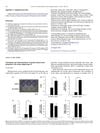 13 citations,
December 2018 in “Development, Growth & Differentiation”
13 citations,
December 2018 in “Development, Growth & Differentiation” Sex hormones, especially estradiol, can change chicken feather shapes and colors.
 10 citations,
June 2016 in “Wound Repair and Regeneration”
10 citations,
June 2016 in “Wound Repair and Regeneration” The microenvironment, especially mechanical forces, plays a crucial role in hair growth and could lead to new treatments for hair loss.
 3 citations,
October 2007 in “Expert Review of Dermatology”
3 citations,
October 2007 in “Expert Review of Dermatology” Hair ages due to various factors and treatments like minoxidil and finasteride can help, but more research and better public awareness are needed.
 2 citations,
November 2022 in “Scientific reports”
2 citations,
November 2022 in “Scientific reports” Using gelatin sponges for deep skin wounds helps bone marrow cells repair tissue without scarring.
 October 2019 in “International journal of research in dermatology”
October 2019 in “International journal of research in dermatology” Misusing topical corticosteroids can cause skin darkening and other side effects.
 January 2018 in “Stem cells in clinical applications”
January 2018 in “Stem cells in clinical applications” Exosomes show promise for tissue repair and regeneration with advantages over traditional cell therapies.
 September 2016 in “Springer eBooks”
September 2016 in “Springer eBooks” Fat-derived stem cells may help treat skin aging and hair loss.
 January 2007 in “Revista del Centro Dermatológico Pascua”
January 2007 in “Revista del Centro Dermatológico Pascua” Hair loss in women, often not related to male hormones, increases with age and can cause significant emotional distress.
93 citations,
May 2002 in “Journal of Investigative Dermatology” Overexpressing thrombospondin-1 in mice skin prevents UVB-induced skin damage.
 4 citations,
March 2013 in “The American Journal of Cosmetic Surgery”
4 citations,
March 2013 in “The American Journal of Cosmetic Surgery” Melanin absorbing light is necessary but not enough for effective hair removal by light treatment.
23 citations,
May 2019 in “Stem cell research & therapy” iPSC-derived stem cells on a special membrane can help repair full-thickness skin defects.
 6 citations,
July 2019 in “Experimental Dermatology”
6 citations,
July 2019 in “Experimental Dermatology” Skin can produce blood cells, often due to disease, which might lead to new treatments for skin and blood conditions.
5 citations,
September 2023 in “Nutrients” Soy protein with isoflavones reduces wrinkles and improves skin hydration in postmenopausal women.
February 2023 in “Medicine in novel technology and devices” Microneedles with traditional Chinese medicine can help regrow hair in androgenic alopecia.
142 citations,
March 2019 in “Molecules/Molecules online/Molecules annual” Cannabinoids may help treat various skin conditions.
53 citations,
January 2013 in “Journal of toxicologic pathology” The project created a standardized system for classifying skin lesions in lab rats and mice.
 15 citations,
November 2023 in “Immunity & ageing”
15 citations,
November 2023 in “Immunity & ageing” TLR4 is important in aging-related diseases and could be a new treatment target.
 12 citations,
April 2008 in “Indian Journal of Dermatology”
12 citations,
April 2008 in “Indian Journal of Dermatology” There's no significant relationship between hair loss (androgenetic alopecia) and demodex infestation.
9 citations,
June 2023 in “Cells” Certain natural and synthetic compounds may help treat inflammatory skin diseases by targeting a specific signaling pathway.
 4 citations,
August 2021 in “Clinics in Dermatology”
4 citations,
August 2021 in “Clinics in Dermatology” Stem cells show promise for hair loss and skin treatments in aesthetics but need more research on safety and standard methods.
1 citations,
June 2014 in “Journal of developmental biology” Retinoic acid helps change skin cells and is important for skin development and hair growth.

New treatments for hair loss should target eight main causes and use specific plant compounds and peptides for better results.
42 citations,
April 2016 in “Plastic and reconstructive surgery/PSEF CD journals” The hydrogel with fractionated PRP improves skin regeneration by enhancing wound healing and growth of skin structures.
11 citations,
August 2021 in “Aging” Collagen and TGF-β2 help maintain hair cell shape and youthfulness.
 11 citations,
June 2012 in “Journal of Dermatological Science”
11 citations,
June 2012 in “Journal of Dermatological Science” Scientists identified a group of human skin cells with high growth and regeneration potential.
January 2020 in “한국공업화학회 연구논문 초록집” Encapsulated hair cells in a special gel can help regenerate hair follicles, potentially treating hair loss.
October 2022 in “International Journal of Molecular Sciences” Fish collagen peptides can significantly promote hair growth.
September 2018 in “Chinese Journal of Dermatology” Angiogenin may help treat hair loss by reducing certain proteins in hair cells.
 23 citations,
July 1996 in “Archives of Dermatological Research”
23 citations,
July 1996 in “Archives of Dermatological Research” bFGF, VEGF, and minoxidil decrease collagen production in hair cells, possibly affecting hair growth.
9 citations,
March 2019 in “Molecular & cellular proteomics” Reductive stress messes up collagen balance and alters cell signaling in human skin cells, which could help treat certain skin diseases.
















